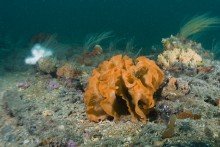A study on the damaged reefs in Lyme Bay have revealed that closure to fishing gear in this area has improved the quality and abundance of marine life, with ross coral, king scallops and large sea-squirts showing definite recovery after three years of protection.
The research began shortly after The Lyme Bay Designated Area (Fishing Restrictions) Order 2008, closing 206km2 to mobile fishing such as dredging and trawling. To assess improvement of the seabed species and habitats, scientists used a towed video to collect information from a number of sample points each year. In comparison to fished areas, the evidence from 2011 showed good progress towards the recovery of habitats and species within this Marine Protected Area (MPA) compared to studies carried out in 2008.
Marine Conservation Officer for Dorset Wildlife Trust, Emma Rance said: “This study proves that MPAs work as an effective win-win for conservation and the fishing industry. The benefits go beyond marine wildlife with healthier and larger seabed communities that are more resilient and productive. The species that spill out beyond the boundary of the protected areas benefit the mobile fishing industry, which are prohibited from working inside the closed area.”
The documented recovery of scallops, which are economically valuable for Lyme Bay, proves that contrary to previous studies, they were affected by damaging fishing methods across Lyme Bay before the closure of the area. As long as protection continues, the scallop population should remain stable and become increasingly important as large scallops grow in number.
There were also some other surprise effects of protection. The nearby “non-reef” habitat with sediment covering the seabed showed the recovery of slow-growing and long-lived reef species of ‘dead man’s fingers’ and ross coral whichprovide shelter and settlement for many species. Emma Rance commented, “This is a good example of why conservation managers must carefully consider protecting the area as a whole and not just draw boundaries around the reef alone”.
Full recovery of sensitive seabeds through MPAs in Dorset is expected to take years. Experience from around the world has shown that this could take decades, which stresses the importance of maintaining levels of protection and continuous monitoring.
To read the full report, visit: https://www.dorsetwildlifetrust.org.uk/marine-life-returns







